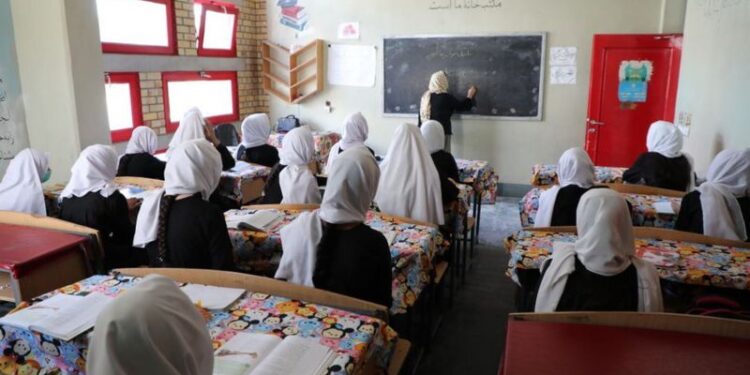The UN experts said in a statement said that the “Taliban de facto authorities” have no justification to deny the right to education, on any grounds, including religion or tradition for girls in Afghanistan.
The statement said that the ongoing “denial of girls and young women’s right to education in Afghanistan marks a global nadir in education, impacting an entire gender, a generation and the future of the country.”
“On 22 March 2023, schools should be reopening to girls across Afghanistan. Instead, it appears that for the second successive school year teenage girls will be banned from resuming their studies – making Afghanistan the only country in the world that forbids girls and young women from attending secondary school and places of higher education,” the statement said. “Education is an enabling right, which is crucial in and of itself and for realising other human rights such as the rights to work, to an adequate standard of living, to health, to participate in society and communities, to equality before the law and to fundamental freedoms. Denying this right to half the population effectively denies women and girls most other human rights.”
“If the Afghan women this year, as the year before, are deprived, we will see that the female generations of Afghanistan will be harmed seriously, including with a rise in forced marriage,” said Mariam Marouf Arveen, a women’s rights activist.
Qatar hosted talks on the future of education in Afghanistan and the challenges and obstacles facing it, the Qatar foreign ministry said in a statement.
The statement said that Assistant Foreign Minister Lolwah Al Khater, with the participation of the CEO of Education Above All Foundation, Fahad Al Sulaiti, represented Qatar in the talks held in Doha, where a delegation from the Afghan Ministry of Education, led by Education Minister Mawlawi Sayyid Habeeb Agha, a delegation of the UNICEF organization headed by UNICEF Regional Director for South Asia George Laria, and the Chief of Strategic Partnerships at Education Cannot Wait Organization Nasser Fakih also participated.
“The participants also agreed on the need to ensure the right to education for all, develop a common vision that deals with challenges, and provide high-quality education opportunities for all Afghan students in all regions,” the statement reads.
The US special envoy for Afghanistan, Rina Amiri, said on Twitter that a “stable and sustainable Afghanistan hinges on reversing extreme policies like the ones banning girls from schools above grade 6.”
Female students have called on the Islamic Emirate to reopen their schools and universities.
“The doors of the schools and universities should reopen for girls within Sharia law,” said Robina Poya, a student.
The Islamic Emirate’s spokesman Zabiullah Mujahid said that efforts are underway to facilitate the reopening of the schools and universities for female students.
“There are relevant organizations–it would be better if (you) contact them on how much progress they have made. But in general, the education for girls is currently halted. We are searching for some solutions,” he said.
Former president Hamid Karzai and the former chairman of the High Council for National Reconciliation, Abdullah Abdullah, also in separate tweets urged the Islamic Emirate to reopen schools for female students.











